Diwali: Meaning, History, & Festivities

Discover more detailed and exciting information on our website. Click the link below to start your adventure: Visit Best Website breakingtrendupdates.com. Don't miss out!
Table of Contents
Diwali: Meaning, History, & Festivities
Diwali, also known as the Festival of Lights, is one of the most significant and joyous festivals celebrated by Hindus, Jains, and Sikhs across the world. This vibrant festival marks the triumph of good over evil, light over darkness, and knowledge over ignorance.
The Meaning of Diwali
The word "Diwali" is derived from the Sanskrit word "Deepavali," which translates to "row of lights." This aptly describes the festival's most prominent feature: rows of diyas (small clay lamps) that illuminate homes and streets, creating a breathtaking spectacle of light.
The History of Diwali
Diwali's origins can be traced back to ancient Hindu mythology. The festival commemorates several significant events:
- The return of Lord Rama: According to the epic Ramayana, Diwali celebrates the triumphant return of Lord Rama, his wife Sita, and his brother Lakshmana to Ayodhya after defeating the demon king Ravana. This victory symbolizes the triumph of good over evil.
- The birth of Lakshmi: Diwali is also associated with the goddess Lakshmi, the Hindu goddess of wealth and prosperity. Legend states that Lakshmi was born on this day, and people celebrate by welcoming her into their homes.
- The defeat of Narakasura: In another legend, Diwali marks the slaying of the demon Narakasura by Lord Krishna. This signifies the victory of light over darkness.
Diwali Festivities
Diwali is a five-day festival, each day with its own significance:
Day 1: Dhanteras: This day is dedicated to worshipping the god of wealth, Dhanvantari. People purchase new utensils, gold, and silver to attract prosperity. Day 2: Choti Diwali (Little Diwali): This day is marked by the worship of Lakshmi-Narayan, the goddess of wealth and the god of prosperity. Day 3: Diwali (Main Festival): The main day of Diwali is celebrated with the lighting of diyas, bursting fireworks, and sharing sweets with family and friends. Day 4: Padwa: This day is dedicated to celebrating the bond between husbands and wives. Day 5: Bhai Dooj: This day celebrates the special bond between siblings, with sisters applying a tilak to their brothers' foreheads and praying for their well-being.
The Significance of Diwali
Diwali is not just a festival of lights and celebrations; it embodies important values and beliefs:
- Overcoming Darkness: Diwali symbolizes the victory of light over darkness, knowledge over ignorance, and good over evil.
- Hope and Renewal: Diwali signifies a time of hope and renewal. It is a chance to reflect on the past and embrace a new beginning.
- Family and Community: Diwali is a time for family and community gatherings. It strengthens bonds and promotes unity.
- Prosperity and Success: Diwali is associated with prosperity, wealth, and success. People celebrate by offering prayers and performing rituals for a good harvest and a prosperous year.
Conclusion
Diwali is a vibrant and joyful festival that holds deep cultural and religious significance. It is a celebration of light, knowledge, and good over evil. The festival brings together people from all walks of life, creating a sense of unity, hope, and joy. The beauty of Diwali lies in its ability to inspire optimism and remind us of the power of light in overcoming darkness.

Thank you for visiting our website wich cover about Diwali: Meaning, History, & Festivities. We hope the information provided has been useful to you. Feel free to contact us if you have any questions or need further assistance. See you next time and dont miss to bookmark.
Thank you for visiting our website wich cover about Diwali: Meaning, History, & Festivities. We hope the information provided has been useful to you. Feel free to contact us if you have any questions or need further assistance. See you next time and dont miss to bookmark.
Featured Posts
-
Genoa X Fiorentina Escalacoes E Transmissao Live
Nov 01, 2024
-
The Cure Nieuwe Plaat Melancholisch Maar Verslavend
Nov 01, 2024
-
Widzew Lodz Awansuje W Pucharze Polski Po Wygranej Z Lechia
Nov 01, 2024
-
Puchar Polski Poznanie Skladow Lechia Zielona Gora Widzew Lodz
Nov 01, 2024
-
Diwali Reception Hosted By Blinken In Us
Nov 01, 2024
